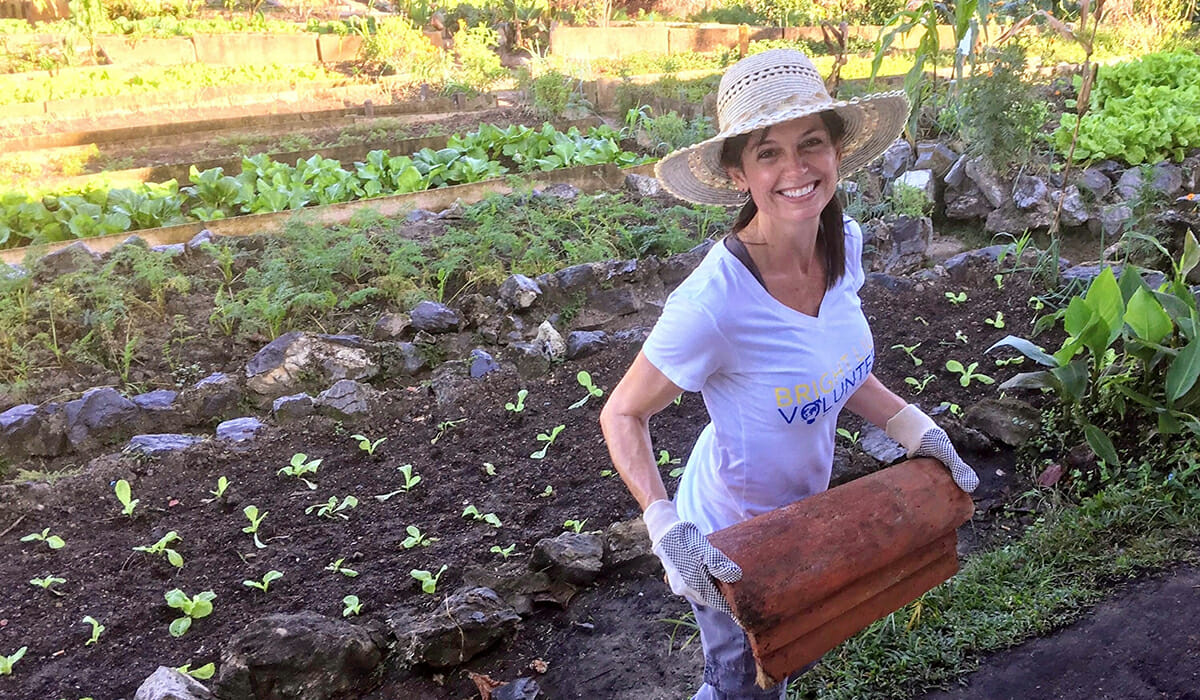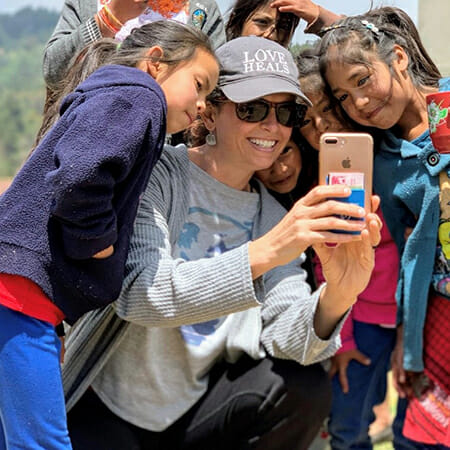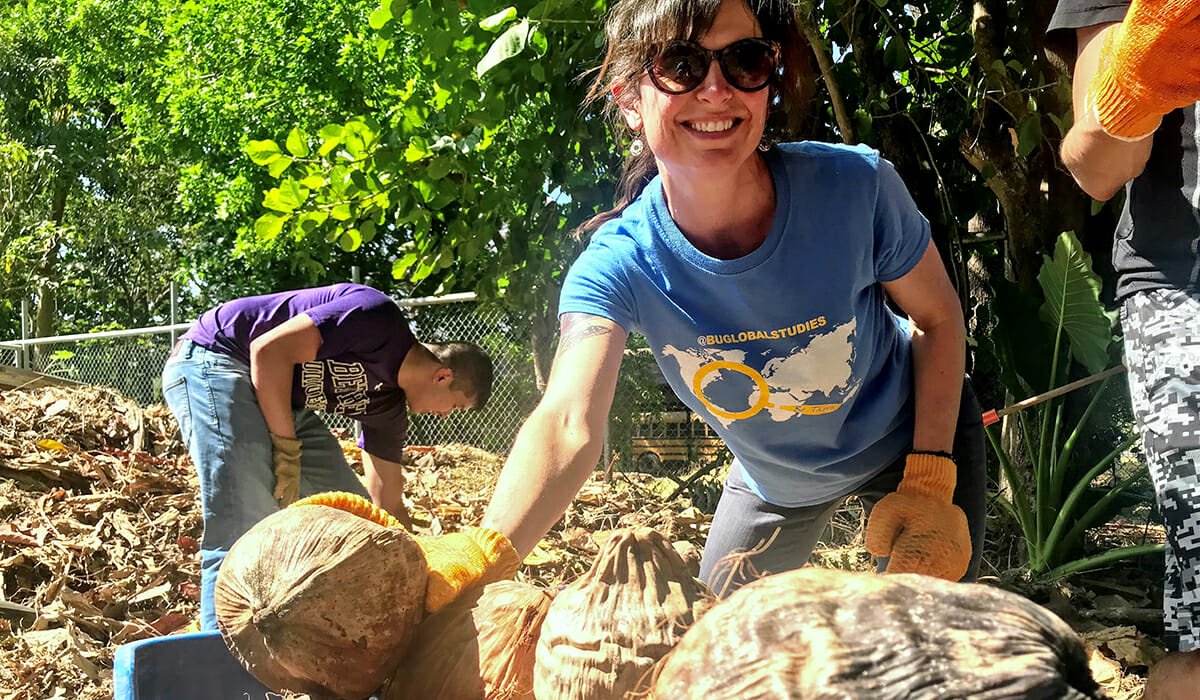University Global Studies Director Leads Students in International Service Work

Meet Daily Point of Light Award honoree Stacie Freeman. Read her story and nominate an outstanding volunteer or family as a Point of Light.
Bethel University Global Studies Director Stacie Freeman said she is trying to instill a love of other people in her students in order to contribute to a more peaceful and sustainable society. To do that, she has partnered her university with Bright Light Volunteers, a nonprofit organization that connects college and high school students with service trips around the world. Ten years ago, Stacie helped start international service trips at Bethel University, a private university in McKenzie, Tennessee. From there, she connected with Bright Light Volunteers’ founder Catherine Greenberg, and formed a partnership with her in 2016 that ultimately led to Stacie becoming co-executive director of the nonprofit.
Since its inception, Bright Light Volunteers has recruited over 7,800 students to complete over 624,000 service hours. While many of Bright Light Volunteers’ student participants are from Tennessee, the nonprofit is nationwide and has worked with students from California to New Jersey. Stacie travels with Bethel University students on all of their trips, which range from volunteering on an organic farm in Cuba to a sea turtle rescue center in Costa Rica. While the COVID-19 pandemic has put a halt to international travel, Bright Light Volunteers has created a virtual internship program for students to volunteer with their community partners from home.
Describe your volunteer role with Bright Light Volunteers.
I wear a couple of different hats at Bright Light. As the co-executive director of the organization, I work on things like grant writing. I recently earned a grant from National Geographic as an educator to improve the online academic component of the program. Students who travel with us take a college class and they get college credit for it. As a National Geographic-certified educator, I had the opportunity to apply for this grant to improve that course, and I earned it and received it. Applying for grants is obviously a big part of that role there. One of the really important things about we do and what I think is one of the unique things about what we do, is that we offer global service learning and citizenship programs to Title I students. Most of the kids that attend our schools are on free or reduced lunch. What that means for me is I have to do a lot of fundraising to get these kids on these programs, because they’re not coming from places of means, and they’re in rural schools which makes them an even more unique population. Study abroad, especially at the high school level, is limited to the coasts and a few major cities in between. What we’re offering to Title I high school students and college students, many of whom are first generation, is an opportunity to study abroad short term and serve internationally. Doing that with that particular population requires a lot of grant writing, a lot of fundraising, and all of the sort of administrative stuff you might expect an executive director would do. I wrote the strategic plan and came up with all the goals and objectives. We organize and oversee board meetings. Catherine and I run the ad campaigns that you see on Facebook and Instagram and other social media platforms. When you’re a small nonprofit like we are with big dreams, there’s a lot of work, and the two of us do the bulk of it.

How did you get involved with Bright Light Volunteers?
Essentially the founder of Bright Light, Catherine Greenberg, and I have been working together off and on for several years to provide international global service opportunities to college students and now high school students. Our relationship really began with her being a program coordinator and me as an educator. I’m the director of Global Studies at Bethel University here in northwest Tennessee. Prior to holding that position, I was an associate professor of sociology and we didn’t really have a global studies program at our university, so I sort of imagined and started a program there at Bethel where students would earn college credit for traveling internationally on what really amounts to a mission trip. The idea was that they would learn about the place they were visiting. They would learn the culture and the history of the people, and develop an appreciation for that side of the experience, but in addition to doing a traditional study abroad, we would also serve in some capacity. When I imagined this program in my mind at Bethel, I began looking for nonprofit partners to help me bring it all to fruition. Long story short, Catherine Greenberg was on the other side of that phone call as were working at Bethel to create this program. She and I began working together to offer these opportunities. She founded Bright Light about halfway through us meeting and me coming on board as the executive director at Bright Light Volunteers.
Really, we’ve not fared far from that mission we started with two years ago this year. Bright Light even to this day is an organization dedicated to providing educational opportunities and service opportunities for high school students and college students who are looking to make the world a better and brighter place. I think we’re both interested in creating a world that is more full of love and more full of peace than when we found it. I think we both believe that education and service and cultural immersion are key places of that puzzle.
What types of service projects have you done?
We built a new cafeteria in Peru. That was a really interesting project. We were in the Maras community of the Peruvian highlands. The situation there was kids were attending school, but some of them were having to walk an hour to two hours to school every morning, and then they were having to walk an hour to two hours home every afternoon. They might eat a little before they left home, but there was no cafeteria, no space to prepare food at this little rural school up in the Peruvian highlands. These kids were basically going most of the day without something to eat. They may have packed a little something in their backpacks, but they weren’t getting a meal. … That’s a long time for a child to sustain themselves without a full meal. We went into the Maras community and we partnered with the local government and school, and we built a brand new cafeteria for the kids from the ground up. Now when they get to school, they have a place not only to prepare meals, but to eat them.
One of the things we always try to do is go into communities first and ask what do they need, so we never ride in our white horses and say “Oh, we’re here, never fear, let us help you with this thing.” We always work with the leaders — the religious leaders, the education leaders, the government leaders, and the community to say “Hey, we have several groups of students we could bring here to volunteer to help you with whatever community-identified need you share with us, what might that look like?” The community decided they needed a cafeteria, so we just went in with the manpower, the materials, the money, the funding, etc., and made it happen. That’s one example of a community-led project we’ve completed. In Costa Rica, we volunteer with a nonprofit that’s dedicated to rescuing sea turtles. When we go to Cuba, we work on an organic farm with the Cuban people which in that capacity, students learn more about sustainability and sustainable farming methods. … We teach in schools around the globe. We teach English primarily, given that English is basically the language of business and education and tourism. That’s just a smattering. We do so many different things.

How have you adapted the program during the COVID-19 pandemic?
It was this time last year I was in Colombia with a group when the world shut down, and we had maybe five more programs after that on the books and nearly 100 more students planning to travel. To have to call all of that off was a really difficult decision. I could see and I was hearing what was happening in China and other places, and it became very apparent to me quickly that 2020 would not involve travel. I’m hopeful we’ll be back in full swing by 2022. What we’ve tried to do in the interim is provide a lot of virtual learning opportunities and we’ve been primarily hosting those through social media. We have a virtual internship program established, so that students who are still interested in getting that international service experience can still volunteer with our partners. What that might look like, for instance — let’s go back to the turtle rescue center. Well, the turtle rescue center has a website. They have accounting needs. They have social media needs. There’s all kinds of things students can do right here at home and still serve the conservation program project we worked on two years ago in Costa Rica. We’ve been trying to connect people virtually to our partners. One of the virtual projects we’ve done at Bethel, and this was just limited to Bethel students, is we’ve been teaching English classes virtually in one of our partner’s schools in Colombia. We try to do things like that to stay connected to our partners, to stay connected to our communities, to keep our students engaged and keep international service and learning on the forefront of their minds, so that when it is time to travel again, they’ll be ready.
What’s been the most rewarding part of your work?
I go to the same places over and over and over. I’ve been to Costa Rica 15 or 20 times. I ran into our registrar a couple years ago in the hall, and she said, “Stacie, where are you going?” I said Costa Rica and I told her what project we’re doing. She said, “Do you ever get tired of going back to Costa Rica?” and I said no. Because the most rewarding part of my work is not the places I get to visit. It’s not the beautiful places and things I’ve gotten to see over the years. It’s the people I get to work with. Every single time we get to travel, it’s a new group of students. The most rewarding part of it for me is seeing every new group seeing Costa Rica for the first time, volunteering internationally for the first time. That light bulb that goes off when they realize we’re all in this together. For one of our projects, we were picking up plastic off a beach in Costa Rica and we were taking it to a toymaker there in Santa Teresa who was upcycling all this refuse from the beach into toys for children, and then Ecobricks for houses and schools. To watch these kids pick up a bottle that clearly came from the United States that’s on a beach in Costa Rica, or a plastic water bottle that has writing in Chinese from literally the other side of the planet, watching that light bulb go off like we’re all in this together, we are one race of people with real problems to solve; then watching them develop an understanding that they can play a part even if it’s small, is hands down the best part of it all.
What do you want people to learn from your story?
I think one person can make a difference. You don’t have to save the world. I think that’s the other thing. I know sometimes we get overwhelmed. I know I do. I look out at the world we live in and I think oh my gosh, how will we ever fix all of this? Well, the reality is that I can’t. And now I can’t take a group of ten students to anywhere in the world. I can’t take them down the street. I can’t take them to Kentucky. I can’t take them to Pennsylvania. I can’t take them to Costa Rica and help solve all the world’s problems. But we can help solve this one thing. Mother Teresa basically said when you do small things with big love, you’re making useful change in the world. At the end of the day, if we all love each other a little more, and if that creates a little more peace on earth, then my job here is mission accomplished.
Do you want to make a difference in your community like Stacie? Find local volunteer opportunities.
